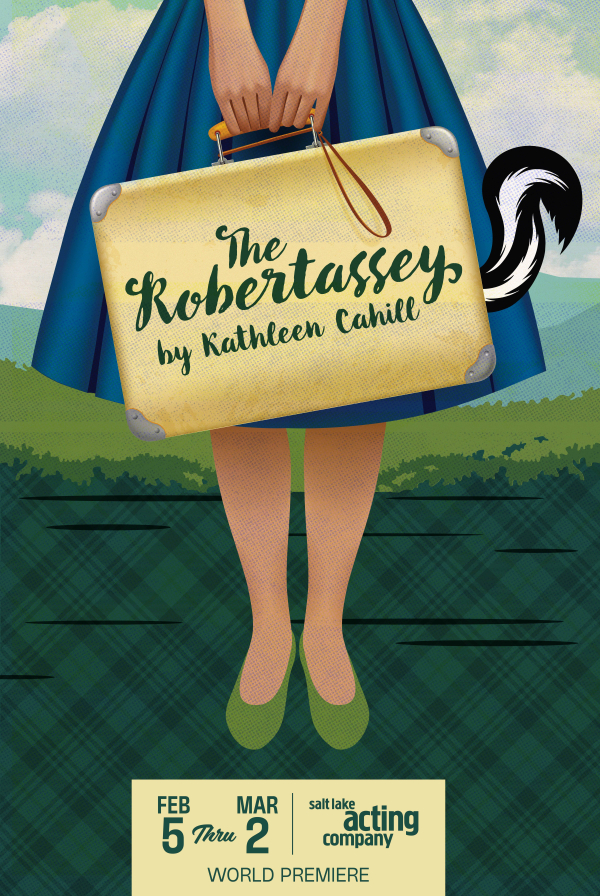“Surely Goodness and Mercy,” A Story of Tough Love
Utah Daily Chronicle | Alina Hansen | September 12, 2017
“Surely Goodness and Mercy,” a Salt Lake Acting Company (SLAC) production, premiered last week in front of highly anticipatory audiences, resulting in multiple sold-out shows.
Written by playwright Chisa Hutchinson, this play was brought to Salt Lake City through the National New Play Network (NNPN). The plot of “Surely Goodness and Mercy” centers on Tino, a 12-year-old boy with a photographic memory who finds out how to overcome hardships through compassion, friendship and community. Bernadette, a lunch lady at Tino’s school, is an older woman that is outwardly strict toward the kids, but actually keeps an eye out for them. Tino is looked after by Bernadette and she saves him a lunch every day. Her acts of kindness, although hidden in abrasive language, sparks a friendship between her and Tino. Deja, a fellow student at Tino’s school, is equally as rough around the edges as Bernadette, but is also quickly softened by Tino’s honest and sympathetic attitude. Tino’s friendships with Bernadette and Deja give him strength as he struggles with an abusive aunt and the loss of his mother.
Sunday’s afternoon showing of “Surely Goodness and Mercy” on Sept. 10 featured exceptional performances by Michelle Love-Day (Alneesa), Yolanda Wood Stange (Bernadette), Jenna Newbold (Deja Cast B) and Clinton Bradt (Tino Cast B). Starting promptly at 1 p.m., “Surely Goodness and Mercy” was presented on a small set that was masterfully put together and paired with music that created a unique atmosphere. Bradt gave depth and vitality to Tino, which was seen through his natural mannerisms and reflective facial expressions that appeared to be honest and real. Bernadette as played by Strange, invoked physical pain deeply set in the body of her character, while perfectly fusing Bernadette’s emotion with her sharp wit, which kept the audience laughing just enough to keep the mood light and receptive during the plays merciless moments.
After the show, a discussion took place providing the audience with an opportunity to ask questions and comment on the play. Executive artistic director Cynthia Fleming, playwright Hutchinson and director Alicia Washington were present alongside the entire cast of “Surely Goodness and Mercy.” Most of the audience remained after the show for the post discussion and commented frequently on how the show was “….an amazing play,” and asked Hutchinson many questions regarding the inspiration for her play and how it came to be. The discussion only lasted about 30 minutes but gave abundant insight into the actors, playwright, and director. The young actors who played casts A and B of Tino and Deja (Bradt, Newbold, Kiara Riddle and Devin Losser) revealed that many of them had little-to-no experience in live theatre, let alone knew much about the culture of African-Americans living in New Jersey. The actors commented on how SLAC and director Alicia Washington gave them the ability to perform in a highly professional theatre. These comments were followed by Washington and the entire cast, acknowledging that Hutchinson provided them the opportunity with this play to perform roles as African-American characters that were not “slaves,” “mammies,” or solely background characters.
“Surely Goodness and Mercy” is a raw play about those in African-American communities, specifically Newark, New Jersey, where the play takes place. Newark was chosen by Hutchinson for its personal significance. Hutchinson grew up in Newark and reflects similar experiences in the play that she had during her childhood. “Surely Goodness and Mercy” features characters that possess aspects of real people that Hutchinson knew. Brutally honest examples of hardships that happen within African-American communities gives “Surely Goodness and Mercy” a soul-stirring quality, touching audiences with its sincerity. “Surely Goodness and Mercy” also emphasizes on a message to African-American communities which says that they do not have to be saved by wealthy Caucasians to overcome their hardships or difficult circumstances (a stereotypical plot extremely popular in film and theatre) but can come together as a community through compassion and friendship.














